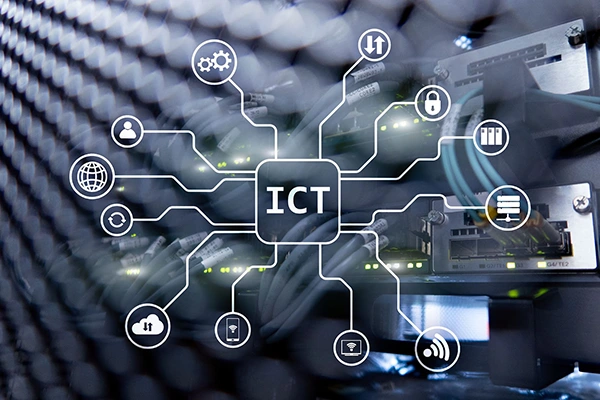Summary: In this Article, you’ll get to read about —
How can businesses stay ahead in today’s rapidly evolving digital age? The answer lies in harnessing the power of Information and Communications Technology (ICT) services. These technological solutions offer a competitive edge by streamlining operations, enhancing customer experiences, and driving innovation.
However, understanding which services are essential and how to implement them effectively is crucial for businesses of all sizes. That said, this article will explore key ICT services and their impact on business growth and success.

What Are ICT Services?
ICT services refer to a broad range of technology-related services that enable the use, management, and exchange of information in various forms. These services are essential for the operation of modern businesses and organizations, facilitating communication, data processing, and overall business operations. Here’s a breakdown of what ICT services include:
1. Telecommunications Services
- Voice Communication: Telephone services, including traditional landlines, mobile communication, and VoIP (Voice over Internet Protocol).
- Data Communication: Internet services, broadband, and wireless connectivity that allow for the transmission of data.
2. IT Services
- Network Management: Designing, implementing, and maintaining local and wide area networks (LAN/WAN) to ensure reliable connectivity.
- Hardware and Software Support: Installation, maintenance, and troubleshooting of physical devices (computers, servers, routers) and software applications.
- Cybersecurity: Protecting systems and data from cyber threats through firewalls, antivirus software, encryption, and other security measures.
3. Cloud Computing Services
- Cloud Storage: Storing data on remote servers accessible via the internet, allowing for scalability and remote access.
- Cloud Computing: Providing computing resources such as processing power, databases, and networking over the cloud.
- Software as a Service (SaaS): Subscription-based software applications hosted on the cloud, such as Customer Relationship Management (CRM) systems and collaboration tools.
4. Digital Communication Services
- Email and Messaging: Platforms for electronic communication, including email, instant messaging, and chat services.
- Video Conferencing: Tools for virtual meetings and conferences, enabling face-to-face communication regardless of location.
- Collaboration Tools: Software that facilitates team collaboration, project management, and document sharing.
5. Managed IT Services
- Outsourced IT Support: Third-party providers that manage a company’s IT infrastructure, ensuring that systems are running efficiently and securely.
- Helpdesk Services: Support for end-users dealing with technical issues, typically through a ticketing system or live support.
6. Software Development and Integration
- Custom Software Development: Creating tailored software solutions to meet specific business needs.
- Systems Integration: Ensuring that different software applications and systems within an organization work seamlessly together.
7. Data Analytics and Business Intelligence
- Data Warehousing: Centralized storage of large amounts of data for analysis.
- Business Intelligence Tools: Software that helps analyze data and generate insights to inform business decisions.
Remember that investing in the right ICT services can lead to sustainable growth and long-term success for your business.
Benefits of ICT

Understanding why ICT services matter is crucial for any business looking to thrive in today’s digital age. Here’s a closer look at how ICT services can transform your business and why they are indispensable for success.
1. Boosting Productivity and Efficiency
- Automation of Tasks: ICT services enable businesses to automate routine and repetitive tasks, freeing up employees to focus on more strategic activities. This leads to higher productivity and efficiency in operations.
- Streamlined Processes: Project management software can help businesses streamline workflows, reduce bottlenecks, and ensure that projects are completed on time.
2. Enhancing Communication
- Internal Communication: ICT services facilitate seamless communication within the organization through email, instant messaging, video conferencing, and collaboration platforms, allowing teams to work together effectively, even remotely.
- External Communication: They also improve how businesses communicate with customers, suppliers, and partners, ensuring clear and timely exchanges that can lead to better relationships and business outcomes.
3. Enabling Better Decision-Making
- Data Analytics: ICT services provide access to advanced data analytics tools that help businesses gather, analyze, and interpret data. This data-driven approach enables more informed decision-making and strategic planning.
- Business Intelligence: By leveraging business intelligence tools, companies can identify trends, forecast future performance, and gain insights that are crucial for staying competitive.
4. Ensuring Data Security
- Cybersecurity: ICT services include robust security measures that protect a business’s data from cyber threats. With the increasing incidence of cyberattacks, ensuring data security is critical for maintaining customer trust and compliance with regulations.
- Disaster Recovery: ICT services often include disaster recovery solutions that ensure business continuity in the event of data loss or system failure.
5. Supporting Scalability and Flexibility
- Scalable Solutions: ICT services, particularly cloud computing, allow businesses to scale their operations up or down as needed without significant upfront investments. This flexibility is crucial for adapting to market changes or business growth.
- Remote Work: The rise of remote work has made ICT services indispensable. They provide the necessary infrastructure for employees to work from anywhere, ensuring smooth business operations.
6. Reducing Costs
- Cost Efficiency: By automating processes and optimizing resource use, ICT services can lead to significant cost savings. Cloud services, for instance, eliminate the need for expensive on-premises infrastructure.
- Outsourcing IT Management: Managed IT services allow businesses to outsource their IT management, reducing the need for an in-house IT team and lowering operational costs.
7. Ensuring Compliance and Standardization
- Regulatory Compliance: ICT services help businesses comply with industry regulations by providing secure and standardized processes for managing and storing data.
- Standardization: They ensure that all business processes are standardized and consistent across the organization, reducing errors and improving quality.
In an industry where information technology is rapidly evolving, investing in ICT services is crucial for long-term success and growth.
Conclusion
ICT services are the lifeblood of modern businesses. They empower organizations to operate efficiently, make data-driven decisions, and deliver exceptional customer experiences. By embracing these communication technologies and integrating them strategically, businesses can unlock new opportunities, enhance competitiveness, and achieve sustained growth.



